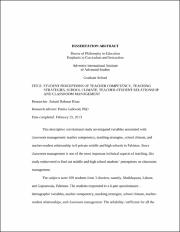| dc.description.abstract | This descriptive correlational study investigated variables associated with classroom management: teacher competency, teaching strategies, school climate, and teacher-student relationship in 6 private middle and high schools in Pakistan. Since classroom management is one of the most important technical aspects of teaching, this study endeavored to find out middle and high school students’ perceptions on classroom management.
The subjects were 209 students from 3 districts; namely, Sheikhupura, Lahore, and Gujranwala, Pakistan. The students responded to a 6-part questionnaire—demographic variables, teacher competency, teaching strategies, school climate, teacher-student relationships, and classroom management. The reliability coefficient for all the
questionnaires was found to be above the acceptable value of .70. Data was collected via surveys conducted on students of 6 selected private middle and high schools. Statistical analysis included both descriptive and inferential analysis such as t test, ANOVA and multiple regression.
Data analysis showed high levels of student perceptions on teacher competency, teaching strategies, school climate, teacher-student relationship, and classroom management. The findings also showed that perceptions on teacher competency, school climate, and teacher-student relationship did not differ by gender, age, and class. But teaching strategies and classroom management had a significant difference in perception by gender, age, and class.
Though there were some differences among students’ perception of teacher competency, teaching strategies, school climate, teacher-student relationship, and classroom management; all the respondents generally agreed that their teachers practice several indicator related to these variables.
Taking into consideration all the variables of the study, 3 predictive models were created. Multiple regression analyses revealed that the model with 2 of the variables—teacher competency and school climate—form a goodness of fit model to predict classroom management. The greatest predictor on classroom management was teacher competency (β = .560, p = 0.000), followed by school climate (β = .216, p = 0.001). | en_US |

